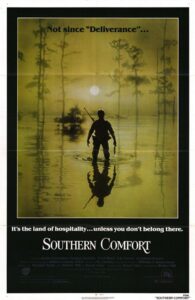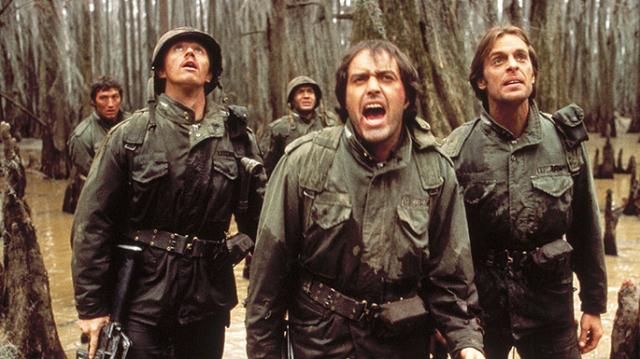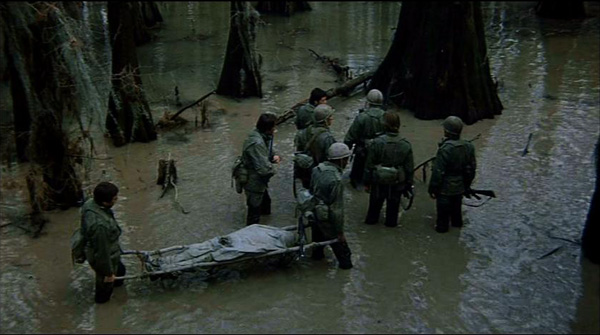Southern Comfort (1981)
“We don’t know the enemy’s strength or his disposition — and while he may have the advantage of familiar terrain, we have the advantage of military training.”
|
Synopsis: |
|
Genres, Themes, Actors, and Directors:
Response to Peary’s Review: With that said, the film has much going for it: it’s beautifully shot (the seemingly endless bayou is all muted greens and grays and browns); Ry Cooder’s score is a “good” one; Powers Boothe gives a fine, enigmatic performance; and there are many genuinely tense sequences — particularly the “nerve-wracking” finale, “in which [Carradine and Boothe] nervously party with seemingly friendly Cajun villagers while looking over their shoulders for the vengeful backwoodsmen”. This extended sequence, shot with dozens of seemingly authentic locals, makes one intensely curious to learn more about this mysterious segment of American society. Note: The film’s tone and subject immediately bring to mind Jon Boorman’s Deliverance (1972), but film fanatics may also be reminded of the little-seen Peary title Shoot (1976). Redeeming Qualities and Moments: Must See? Links: |



2 thoughts on “Southern Comfort (1981)”
First viewing. Not a must. Actually, among the dullest ‘action’ films ever.
Co-writer David Giler was on board for ‘Alien’ – released two years prior – and ‘Southern Comfort’ comes off like ‘Alien’ without an alien, just Cajuns. It also reads like a re-tread of the film ‘And Then There Were None’, or ‘Ten Little Indians’. Once you get wind of that, the predictability of it is all too apparent.
There’s an awful lot of male posturing in this film, and a fair share of banal dialogue to match it (“There’s a time you have to abandon principles and do what’s right!”). As well, several of the cast-for-macho-type actors simply seem to be ‘acting’ macho. To a degree, that’s the fault of the script – even so, it’s oddly unbelievable.
Keith Carradine is the least effective of all. (Odd that Altman was able to work well with him in ‘Nashville’, as did Alan Rudolph in ‘Choose Me’.) But then, he’s saddled with some of the most verbose dialogue ever put into the mouth of an average heterosexual military male character!
Director Hill finally manages to sneak in some real finesse in the final sequence as he stretches the tension amid deceptive tranquility. The rest of the film is often oddly static – and there’s a big bunch of scenes of guys just w-a-l-k-i-n-g in the bayou.
At least one unintentionally funny bit: a distraught guardsman cries out with “I’m not supposed to be here!” and, at that point, is simply blown away!
Well, he DID say…
In the same way that ‘Deliverance’ (1978) showed us city-folk that going for a country trek could be hazardous to your health, this film screams it twofold. Not only do the swamps and surroundings paralyze us, but the locals prove to be the worst. Even when you do make it out to one of the dirty, dingy ‘towns’ the tension doesn’t let up. The locals prove more unnerving than the menacing swampland.
It’s interesting to note that National Guardsmen are portrayed here instead of an Army platoon. Maybe the filmmakers were cautious in denigrating actual soldiers as weak and cowardly.
Film brings together a stellar ‘cult classic’ cast headed by Keith Carradine, Powers Boothe, Fred Ward and in a minor role Brion James (one of my all-time favorites) as a trapper with a conscious.
This is my favorite Walter Hill film so far, with a superb score by regular ‘compadre’ Ry Cooder. Andrew Laszlos’ cinematography is aptly ‘lush-green’.